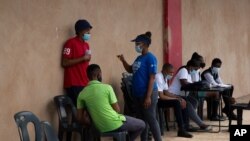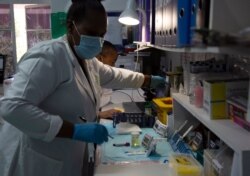Tuesday is World AIDS Day, with organizations around the world highlighting the need to support those living with and affected by HIV, the virus that causes the disease, while also remembering those who have died.
This year’s event comes amid the global coronavirus pandemic, which UNAIDS says has made it more difficult for those living with HIV to access health care and other services while also highlighting issues such as inequality and stigma.
The agency is calling on governments to boost investment and action on HIV and other pandemics. It says if there were better health and social safety nets in place, the world would have been better able to slow the spread of the coronavirus.
The United Nations said models show there could be an additional 123,000 to 293,000 new HIV infections and between 69,000 and 148,000 AIDS-related deaths by 2022 because of the coronavirus pandemic’s effects on HIV responses.
“The collective failure to invest sufficiently in comprehensive, rights-based, people-centered HIV responses has come at a terrible price,” UNAIDS Executive Director Winnie Byanyima said in a statement. “Implementing just the most politically palatable programs will not turn the tide against COVID-19 or end AIDS. To get the global response back on track will require putting people first and tackling the inequalities on which epidemics thrive.”
The joint challenges of HIV/AIDS and the coronavirus are also the focus of a live-streamed event Tuesday by the National AIDS Memorial in the United States. It includes discussions with Dr. Anthony Fauci and Dr. David Ho, who each have experience working on both pandemics, as well as with activists and the mayors of Atlanta, Chicago and New York.
There are about 38 million people living with HIV, with 26 million accessing antiretroviral therapy. In 2019, 690,000 died of AIDS-related illnesses.






